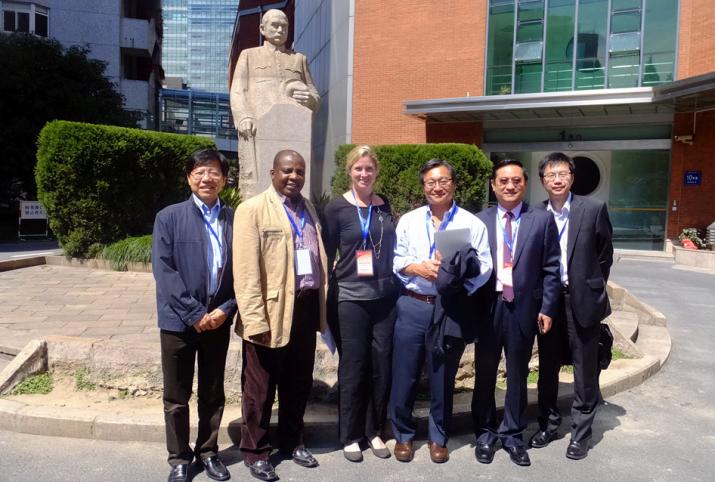
Global health fellow Kristin Schroeder poses with Duke colleagues and other symposium speakers: (l to r) Qingyi Wei, Nestory Masalu, Kristin Schroeder, Nelson Chao, Jian Zhou and Shenglan Tang
Published October 13, 2015, last updated on June 3, 2020 under Research News
On September 19, Duke and Fudan Universities hosted a Global Cancer Symposium at Fudan University in Shanghai, China.
Speakers and participants engaged in discussions about overcoming the challenges of conducting cancer research and providing cancer care in low- and middle-income countries (LMICs), with a particular emphasis on liver cancer because of its prevalence in China. The event also provided a forum for existing partners to further their collaboration and for speakers and attendees to build connections for future collaborations.
The symposium brought together key representatives from institutions in the Duke global oncology partnership—Bugando Medical Centre in Tanzania, Barretos Cancer Center in Brazil, Tata Medical Center in India, and Duke—as well as a number of Chinese researchers and physicians. Approximately 100 researchers, students, oncologists and surgeons from China attended the event.
Speakers Hailed from China, U.S., India, Tanzania and Brazil
Zhaoyou Tang, a renowned liver cancer researcher based at Fudan University, gave the keynote address. He provided a review of the “war on cancer” in the past century and discussed the importance of bringing an integrative approach to cancer care—that is, considering how different environmental, psychosocial and lifestyle factors contribute to cancer development and metastases risk.
Speakers from the Duke Global Health Institute (DGHI) included Nelson Chao, head of the DGHI global cancer research priority area and co-organizer of the symposium, and Shenglan Tang, professor of medicine and global health. Chao spoke about global oncology at Duke and Tang discussed the health insurance infrastructure in China and how it influences cancer care and the cost of cancer treatment. Qingyi Wei, professor at the Duke Cancer Institute, gave a presentation about the use of large cohorts of patients to understand the genetic basis of diseases using genome wide analyses.
Each of the three key representatives from the Duke global oncology partnership institutions also presented:
- Nestory Masalu, director of oncology at the Bugando Medical Center in Tanzania, spoke about challenges in diagnoses and treatment of liver cancer in Tanzania and other LMICs.
- Gustavo Zucca-Matthes, director of mastology and breast reconstruction at the Barretos Cancer Center in Brazil, discussed breast reconstruction and approaches for providing comprehensive oncology prevention and treatment in low-resource settings, such as the use of mobile clinics.
- Mammen Chandy, clinical hematolotgist at the Tata Medical Center in India, discussed the development of antibiotic protocols in light of growing antibiotic resistance in many LMICs.
Furthering Existing Partnerships, Developing New Ones
In addition to providing an opportunity for Duke researchers—including Shenglan Tang, Nelson Chao and global health fellow Kristin Schroeder—to meet with existing collaborators from India, Tanzania and Brazil, the symposium gave the partners a chance to learn more about global cancer work being done at Fudan University.
DGHI has a longstanding partnership with Fudan University, but to date, the partnership has centered around research topics such as chronic disease, aging and access to health care. Chao hopes to expand this partnership to include collaborative global cancer projects. The Fudan University Shanghai Cancer Center, which serves nearly one million patients per year, is known for its high-caliber research and clinical care.
While in Shanghai, the DGHI contingent and others from the Duke global oncology partnership institutions toured the cancer center to learn more about their approach to cancer care. The week after the conference, Schroeder gave a presentation at the global health department in the School of Public Health at Fudan University on addressing global cancer challenges in low-resource settings.
“We were thrilled to have the opportunity to hear about the excellent work the physicians and researchers are doing at the Fudan University Shanghai Cancer Center,” said Chao. “We look forward to building on our existing partnership with this excellent institution and exploring new ways to address global cancer issues together."


